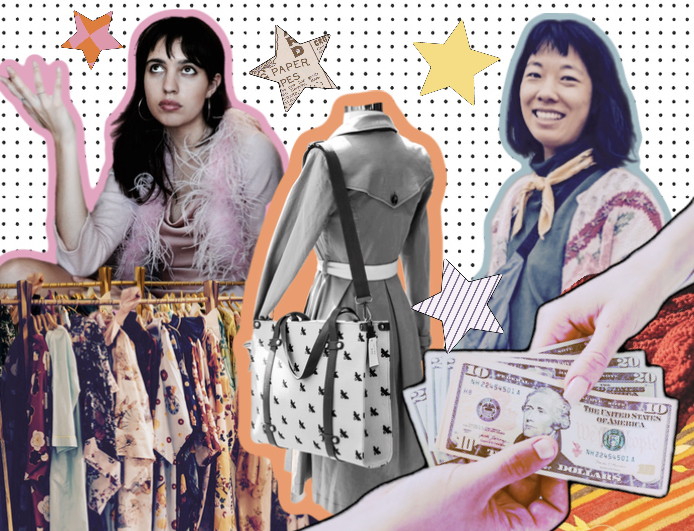
Lily Fang isn’t your average ethical fashion influencer. She doesn’t tell her nearly 25,000 followers to only buy clothing from sustainable brands, which can be significantly more expensive than other pieces. In fact, she said buying from fast fashion companies is acceptable in some cases.
“Advocating for 100 percent sustainability is unreasonable, unwelcoming, and ignorant,” she said. “There are many alternatives to fast fashion, from thrift stores to secondhand apps to sustainable brands, but it often takes more time, money and effort to pursue these alternatives.”
Fang is one of a growing number of influencers pushing back against the trendy-but-expensive “minimalist wardrobe” – hand-loomed sundresses, cashmere knitwear and $90 t-shirts – and other high-end fashion concepts that are eco-friendly but largely inaccessible to most of their followers.
While a survey conducted in 2020 found that 67 percent of consumers consider the use of sustainable materials to be important when buying clothes, another report determined that less than a third of consumers are actually willing to pay more for eco-friendly clothes.
In recent years, high-earning influencers have promoted – even preached – ethical fashion. That’s turned off many social media users, who complain that the movement has been spun into an unattainable lifestyle by tone-deaf brand ambassadors. In turn, some influencers have fired back and shamed those who don’t shop sustainably, giving rise to “ethical fashion mean girls,” a term coined by influencer Marielle Elizabeth. These hostile exchanges have created a moral high ground of sorts – which critics say does nothing to help the ethical fashion movement.
Gaia Rattazzi, a social media specialist from Leeds, UK, who runs an ethical fashion Instagram account, admitted she used to come off as judgmental to people who bought from fast fashion brands. But now, with her content being consumed by nearly 52,000 followers, she recognizes that not all 52,000 of them have the same access to sustainable fashion. “There is a hierarchy with people who have a lot of money and can buy from sustainable brands and then they can feel better about themselves, while other people feel ashamed,” she said. “And that’s not how it should be.”
Another Way
As a solution to the hostility, influencers like Fang are offering the idea of “imperfect” ethical fashion — a nod to the broader movement of imperfect environmentalism. The term was coined in 2013 by actress Sara Gilbert, who wrote in her book, The Imperfect Environmentalist, that thousands of people taking an imperfect approach to sustainable living will have a drastically larger impact than hundreds of people living 100 percent sustainably.
In the fashion vein, this means that all those ethical fashion influencers making haul videos of, say, 20 items from sustainable brands could actually be doing more damage than someone who buys one shirt from a fast fashion brand, as long as that person is taking care of that shirt so it lasts a long time.
“Imperfect sustainable living represents the vast majority of us trying to make these types of changes in our daily lives,” said Melissa Gamble, assistant professor in the fashion studies department of Columbia College. “Making intentional choices in your purchases counts, and making small changes where you are able makes a difference.”
On Fang’s blog, “Imperfect Idealist,” she writes about how her followers can make a difference as fashion consumers, from mending clothes when they rip to repurposing ratty clothes as rags to use around the house. By doing this, Fang, who also has a full-time job at an education startup, hopes to “redefine what it means to be an influencer by mostly providing educational content.”
The term “ethical fashion influencer” is in itself oxymoronic, as true ethical fashion is achieved by reducing consumption – and the typical job of an influencer is to drive consumption. This is not lost on Rattazzi, who prefers to call herself an educator. “If you want to monetize your social media, you do have to sell products,” she said. “I don’t want to be that person that says ‘buy less’ but also says ‘buy these recycled plastic leggings.’ It just doesn’t feel right.”
Instead of using her platform to market sustainable brands, Rattazzi chooses to spread the message that the most sustainable clothes are ones you already own. “Maybe you like to sew and you can learn to repair your clothes. There are so many ways we can repurpose clothes, upcycle them or re-wear them in different ways,” she said.
An All-Consuming Habit
While social media users accuse the ethical fashion “mean girls” of classism, some say the bigger enemy is overconsumption in general.
A popular Youtuber who goes by the screen name “Broey Deschanel” weighed in on the debate last year, posting a video called “Why No One Wins the Fast Fashion Debate” that’s racked up nearly 380,000 views. “It’s pretty widely understood by now that with cheap clothes in your local mall comes the great suffering of someone overseas,” she said in the video, referring to unlivable wages paid to garment workers in developing nations. “Not to mention the disastrous effects the fast fashion industry has on our climate.”
But people who consume more than they need are not true victims of classism. In fact, using classism to defend their shopping habits undermines the struggles of those who truly can’t afford basic necessities. In an interview, Deschanel (who doesn’t disclose her real last name, but her first name is Maia) said the fast fashion debate invites larger conversations about poverty.
“We have abject poverty in North America – there’s no denying that,” she said. However, those living in destitution usually aren’t the ones speaking out against classism in ethical fashion. Rather, it’s middle-class consumers who buy clothing in bulk from fast fashion sites to stay on top of the trend cycle, who participate in overconsumption that’s “next to impossible” to overthrow, she said. “There’s so much that’s spiritually wrapped up in it. This consumption is tied to our self confidence and our sense of self worth.”
With that behavior so ingrained, demanding that everyone stop buying from fast fashion brands may not be the cut-and-dry solution many hoped it would be. The advocates for “imperfect” ethical fashion say that’s okay, as long as we tackle the problem of overconsumption. “If you buy one, two items from fast fashion brands every year, you’re not going to be part of the problem,” Rattazzi said. “Buy only what you need and take care of them.”
While pending laws such as the New York Fashion Act – which would require mandatory social and environmental due diligence from companies – could overhaul the fashion industry, a large portion of the responsibility is currently left up to the consumer.
Instead of demanding perfection, giving consumers permission to be imperfect is the footbridge they need to participate in ethical fashion, Fang said. “If you want the movement to succeed, you need more people in it,” she said, “so approaching ethical fashion from a place of education is always better than blaming those who don’t participate.”



